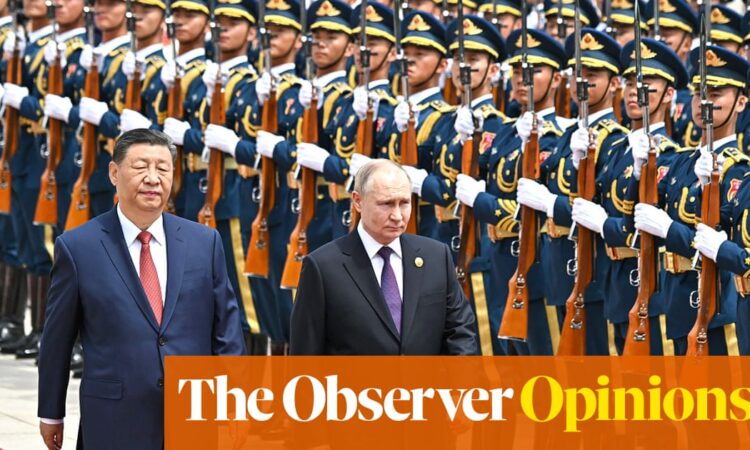
Vladimir Putin is digging deep to win the war with Ukraine. And it could be only months before the tide turns in his favour. If he pummels Ukraine into submission, a military victory will quickly become a wider economic disaster, which is why we underestimate at our peril how much we need to focus on the war.
The Russian leader, who was inaugurated for a fifth term as president a fortnight ago, ditched his old friend and defence minister Sergei Shoigu on Monday in favour of an economist to make sure Moscow’s war machine runs more efficiently. That economist, Andrei Belousov, has been likened to Albert Speer, the architect who served as the minister of armaments and war production in Nazi Germany.
On Thursday, Putin visited China to reaffirm relations with his main trading partner and thank his counterpart, Xi Jinping, for facilitating shipments of tech and components essential for the war effort.
These moves show Putin has become a leader who not only believes in war, in the sense that he believes in Moscow’s mythical project to recapture land that “rightly” belongs to Russia, but who also needs the war to stay in power.
He can sense weakness in the opposition, now he has knocked out almost 40% of Ukraine’s electricity supply and knows Kyiv is running low on volunteers for the army.
Alongside the military conflict, Putin is also waging an economic one aimed at destabilising EU nations and the UK for Russia’s benefit. Ukraine is rich in minerals and hosts vast farms that produce, among other things, 20% of the world’s wheat. Global food prices are low again after Ukrainian officials found ways to export by land and sea. However, once under Moscow’s control, basic commodities would again become a political weapon, sending prices rocketing, and undermining the legitimacy of democratic governments.
More than Brexit, which we know Putin had a hand in fomenting, and more than the conflict in the Middle East, which Russia, and the Soviet Union before it, also fostered whenever they could, the war in Ukraine ranks alongside the climate crisis as an existential threat to Europe.
The difference with climate change is that the next few months in the war are not just important, they are vital. Russia’s attack in the north, which threatens Kharkiv, is the first stage in a bid to break the deadlock across the eastern front.
With China’s unofficial support and an economy that has gradually shifted over to the manufacture of military hardware and support services for the army, navy and air force, Putin is readying himself for a major offensive.
With extra resources available to Putin, Britain itself could be targeted. Latest intelligence warns that Russian-backed ransomware attacks on UK businesses and public organisations could step up a gear. Last week, Anne Keast-Butler used her first major speech as boss of Britain’s signals intelligence operations to highlight the immediate danger posed by the Kremlin’s encouragement of partisan cyberwarriors, with warnings the conflict could move from the digital sphere to “physical surveillance and sabotage operations”.
“Before, Russia simply created the right environments for these groups to operate but now they are nurturing and inspiring these non-state cyber actors and, in some cases, seemingly coordinating physical attacks against the west,” said Keast-Butler.
after newsletter promotion
Putin is not a pantomime villain. He is the real deal. The EU and Britain need to join the US in coming up with even more money for Volodymyr Zelenskiy. Handwringing by the UK Treasury and the European Commission is holding up attempts to confiscate $300bn of Russian central bank funds, mostly sitting in Belgium’s Euroclear exchange.
EU officials are minded to take the interest generated by the funds but not all of the $300bn, despite legal advice that says the money can be sequestrated. Philippa Webb, a professor of international law at King’s College London and an adviser to the European parliament, says the confiscation of central bank assets is a breach of international law unless it can be considered a “countermeasure”.
“International law provides that violations may be justified if the action is ‘taken in response to a previous internationally wrongful act of another state and … directed against that state’, so long as certain requirements are met,” she says. Among these conditions is that the measure has “the object of inducing compliance with an international obligation, it is proportionate, and is temporary and reversible”.
The money could be used to rectify the estimated $486bn worth of damage inflicted on Ukraine by Putin, freeing up other funds for the military battles ahead.
No one wants to think about war in Europe, but there is a war, like it or not, and someone will win. It had better not be Putin.






